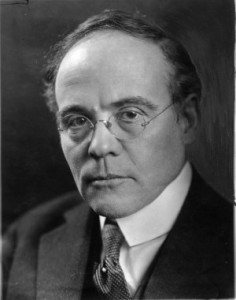 Born in Kansas in 1868, Edgar Lee Masters was the author of a wide range of novels and books of poetry that set him up as one of the major literary voices of America. His collection of short poems, The Spoon River Anthology, is perhaps his most famous contribution to the art and was composed late on in life when he was approaching his 50s.
Born in Kansas in 1868, Edgar Lee Masters was the author of a wide range of novels and books of poetry that set him up as one of the major literary voices of America. His collection of short poems, The Spoon River Anthology, is perhaps his most famous contribution to the art and was composed late on in life when he was approaching his 50s.
Raised in Illinois and the Midwest, with its historical connection to Abraham Lincoln, Edgar Lee Masters trained as a lawyer and would work some thirty years for a firm in Chicago. Beyond that, however, he harbored deep literary ambitions and started publishing his poetry early on under various pseudonyms.
Up until 1915 he had published a few books of poetry and several essays but had received little or no critical attention. Playing around with the form of his poems, he settled on the idea of writing about the people he had known in his youth. He used various styles from classical Greek forms to epigrams.

The Spoon River Anthology, published in 1915, offered a cynical expose of Middle America, exploring issues such as sex, moral decadence and the hypocrisy of small town values. He used the setting of the cemetery in his home town to express his ideas in the form of epitaphs, getting the dead to talk about their lives in free flow poetry. The anthology was popular but brought both praise and criticism.
What made the work ground breaking was that, up until then, small town America was seen as a bastion of what was good in the world. Masters’ collection unveiled the fornication, petty rivalries and thefts that went on under the surface.
The subject matter of the Spoon River Anthology soon meant that his work was passing beyond the province of fellow poets and literary critics to the general public. The scandal contained in the verses quickly ensured its popularity and it became one of the bestsellers of the time. Whilst many criticized Masters for the way his poems treated Midwest America, poets such as Ezra Pound welcomed his honesty:

The Spoon River Anthology was Edgar Lee Masters’ high point. He would produce a number of other works in the years to come, including a sequel, but none would reach the dizzy heights of his small town America expose.
In 1920, Masters divorced from his wife and children, gave up his life in law, and moved to New York, taking up residence in the Chelsea Hotel to devote his time to purely writing. He produced ambitious biographies of both Abraham Lincoln and Mark Twain and continued to write poetry. In 1926, he remarried and, in his later days, received awards for his earlier collections such as the Spoon River Anthology.

In 1950, Edgar Lee Masters passed away at the age of 81 at Melrose Park Convalescence Home in Pennsylvania. He was laid to rest in Petersburg.

